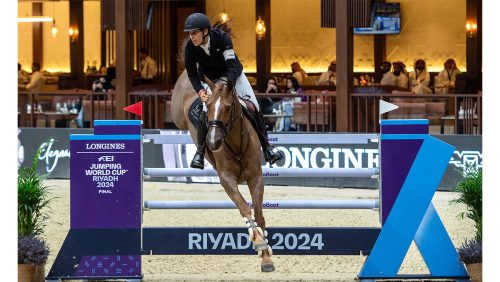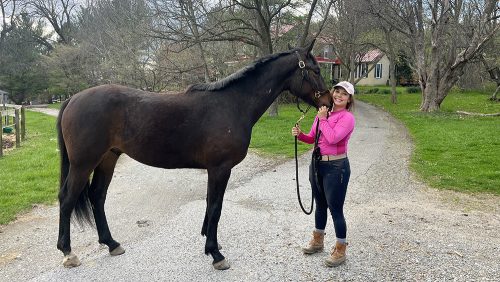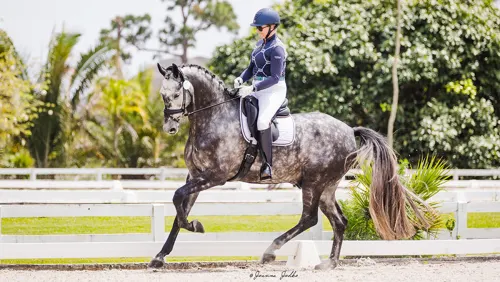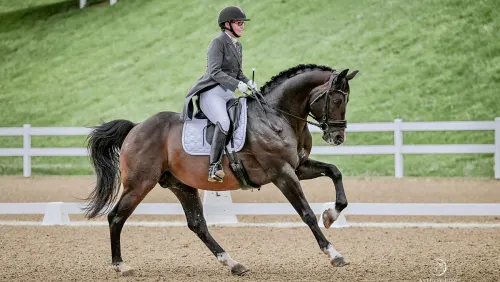You’ll normally find Jacquie Brooks piaffing and passaging her way through the Grand Prix as she represents Canada in pure dressage, but this weekend, she’s standing ringside and helping the eventers put that extra polish on their tests. So the Chronicle caught up with her to learn a few tips for many eventers’ and event horses’ least favorite phase.
How did you get involved in coaching event riders?
“I worked with David [O’Connor, when he was coaching] the Canadians, and I still work with a lot of the Canadians at home. Then he brought me down to do some work with his riders, and they started setting up clinics at the O’Connor Event Team’s farm in Virginia.”
What’s the main difference between event horse dressage and pure dressage?
“These guys are really fit. Our dressage horses are fit too, but they’re fit in a different way. We have to fire them up a little bit right before we go in. Some of these horses you can still do that. Some of them fire themselves up, so some of the posture and corrections you make in the ring are to stop them from boiling over.
How to put pressure on their bodies is also different. They need a different way of going for all three phases. It’s like a triathlete compared to a pure runner or a pure swimmer or a pure cyclist.
But horses are horses. The physics is the same. The balance is the same. The mentality is basically the same. How do you influence them in a way that it’s a positive influence? That they’re receptive to being influenced like that to produce the kind of results you want in the ring. We’re all kind of on the same page in that way.”
What else is different about coaching eventers?
“Their body awareness because of the other phases. They’re used to independent balance over fences. They’re used to letting their horses be more free and keeping their balance with different horses. Some of the words I use, I can alter them a little bit there, and say, ‘You know when you do this over a fence.’ You would never think of that way in pure dressage.”
ADVERTISEMENT
What can eventers teach pure dressage riders?
“It’s no secret that the eventers aren’t afraid to go forward. They’re not afraid that going forward a few times is going to upset the apple cart for the rest of the ride. You can let some steam off.
Because these guys are used to their horses galloping underneath them, they’re used to giving their horses options to make choices for themselves. When you start to teach them, to make that horse make a decision about what it wants to do in that moment, change its balance, go sideways, whatever it is, they’re used to their horses making good decisions, and they trust their horses to make good decisions because out there on cross-country, the horse is the one making a lot of the decisions. The riders get them there, and then the horse has to solve that question.
The horses are very open to that idea. The way that I’ve learned it and Ashley [Holzer’s] trained me, our whole system is letting our horses make good choices too. So it’s very similar. I don’t correct the horse unless it’s making a bad decision. If it’s making a good decision, you let them go with it.
The horses are clever. They’re easy and they’re used to lots of horses around and lots of trade fairs and lanes and people. That part is fun too. The jog here, they had 100 horses milling around. If there are more than 10 we’re all panicking!”
What could eventers learn from pure dressage riders?
“The eventers are often balanced over their horse. They need to be when they’re going over fences. They don’t want to get left behind, and they don’t want to get ahead. Once you start to really power a horse up in the shoulders and up to the reins, you are sitting a little behind the horse. You’re keeping that horse really in front of you. When you look at a pure dressage horse, we’re really saying, ‘Get out there and do it. Get up there in your shoulders.’
Some of the horses could be put more there. Some of them can really handle it. Some of them need to be more in a neutral place where you’re not saying go all the way up there and then they explode out the other side. By the three-star level they should all like Prix St. Georges horses. It’s fun to work with so many where you’re seeing that change in the way the horse is presenting itself. It’s getting more uphill and more ahead of them.
ADVERTISEMENT
The riders have had that feeling every once in a while, and they know it’s right. They’re like, ‘How do I get it again? What are the tools to get that again?’ I’m sure it’s the same in everything: ‘Where’s that sweet spot over that jump? Where’s that perfect distance?’ I would miss it every time, and then I’d hit it once, and I’d be saying to someone teaching me, ‘How did I get there? How do I get there again? Where was that jump?’
That’s a lot of what I’m doing here. They’re getting there. They know where it is. It’s just finding that road that’s more consistent, or getting it so they can make those changes in the ring. They can make a change in the way they’re riding in that moment to change that.”
What do you do on cross-country day?
“Sadly I’ve yet to stay for cross-country. I have a clinic coming up this weekend. When I’m away for more than two horses, you know. It’s not good. I need to start staying. I’m also nervous for them. On the dressage days I’m busy. I don’t have time to get nervous.”
Who has the better parties?
“Horse people are horse people. Everyone works hard, and everyone wants to celebrate how hard they’ve worked. Regardless of how it actually goes in the ring, by the time we come here, the work is done. We’ve worked hard, and we should enjoy whatever happens. We should enjoy that show, and then go home and work hard again. We should enjoy our reward for that hard work. The release part is always good.”















